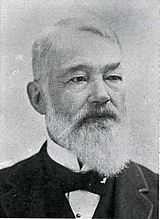Benjamin Stark facts for kids
Quick facts for kids
Benjamin Stark
|
|
|---|---|
 |
|
| United States Senator from Oregon |
|
| In office October 29, 1861 – September 12, 1862 |
|
| Appointed by | John Whiteaker |
| Preceded by | Edward Dickinson Baker |
| Succeeded by | Benjamin F. Harding |
| Personal details | |
| Born | June 26, 1820 New Orleans, Louisiana |
| Died | October 10, 1898 (aged 78) New London, Connecticut |
| Political party | Democratic |
| Spouse | Elizabeth Molthrop |
| Profession | attorney, merchant |
Benjamin Stark (June 26, 1820 – October 10, 1898) was an American businessman and politician. He was born in Louisiana and later became important in the early history of Portland, Oregon. He bought some of the first pieces of land that became the city. Stark also served in the Oregon House of Representatives and later as a United States Senator for Oregon. He was a member of the Democratic Party.
Contents
Early Life and Education
Benjamin Stark was born in New Orleans, Louisiana, on June 26, 1820. His family later moved to Connecticut. He studied at Union School in New London, Connecticut, where he learned about classic subjects. He then went on to graduate from the Hebron Academy in Maine. From 1835 to 1845, he worked in business in New York City and also studied law.
Moving to Oregon
In 1845, Benjamin Stark sailed to what would become Portland, Oregon. He was the supercargo (which means he was in charge of the ship's cargo) on a ship called the Toulon. He brought goods for a warehouse owned by Francis Pettygrove.
Buying Land in Portland
In 1846, Stark bought half of Asa Lovejoy's land claim. This claim was about 640 acres and became the original site of the future city of Portland. He paid $390 for it. Stark bought the land to sell later for a profit, not to live on. Because of this, he kept sailing as a merchant and only visited his land sometimes. Even though he was often away, Stark was an important leader in early Portland. For example, he led the city's Freemasons, which was a respected group at the time.
Gold Rush and Land Disputes
In 1848, Stark sailed to San Francisco to join the California Gold Rush. He worked as a merchant there from 1849 to 1850. When he returned to Portland in 1850, he found that his land claim was being challenged.
He met with Daniel H. Lownsdale in San Francisco to settle the issue. They agreed that Stark would own a specific triangular area in what is now downtown Portland. This area was between the Willamette River, Stark Street, and Ankeny Street. In return for giving up the rest of the land, Lownsdale and others paid Stark for parts of his land they had already sold. This triangular section was about 48 acres and included most of the downtown area back then. Later, another disagreement happened when Stark did not want to give up two small blocks needed to connect the park blocks.
Political Career
In 1850, Benjamin Stark became a lawyer. In 1852, he was elected to the House of Representatives for the Oregon Territory. He represented Washington County, which included Portland at that time, and was a member of the Whig party. Stark also served as a colonel in 1853 during conflicts between settlers and Native Americans in the Rogue River Wars. He married Elizabeth Molthrop.
Serving in the Senate
In 1860, Stark was again elected to the Oregon House of Representatives. This time, he represented Multnomah County (which was created in 1854) and was a Democrat. In October 1861, Oregon's Senator, Edward Dickinson Baker, died during the American Civil War. Oregon Governor John Whiteaker chose Stark to take Baker's place in the United States Senate. Stark served from October 29, 1861, to September 12, 1862. During his time in the Senate, he held views that supported the practice of slavery and was against the idea of publicly funded schools. He did not run for re-election, and Benjamin F. Harding took his place.
Later Years and Legacy
In 1864, Stark was a representative at the 1864 Democratic National Convention in Chicago. He became very wealthy by selling parts of his land in what is now Downtown Portland. After his time in Congress, Stark went back to practicing law. He later moved back east to New London, Connecticut. There, he became a member of the city's board of aldermen (city council) from 1873 to 1874. In 1874, he was elected to the Connecticut House of Representatives. He also served on the Connecticut State Prison Commission. Benjamin Stark passed away in New London, Connecticut on October 10, 1898, at 78 years old. He was buried in Cedar Grove Cemetery.
The Clyde Hotel in Portland was renamed the Ben Stark Hotel in 1987, but it became the Ace Hotel in 2005. A street in Portland, Stark Street, is named after him. In late 2017, some people suggested renaming Southwest Stark Street after gay rights activist Harvey Milk. They pointed out that Benjamin Stark had views that supported slavery and was known for his racist opinions.
 | Selma Burke |
 | Pauline Powell Burns |
 | Frederick J. Brown |
 | Robert Blackburn |

